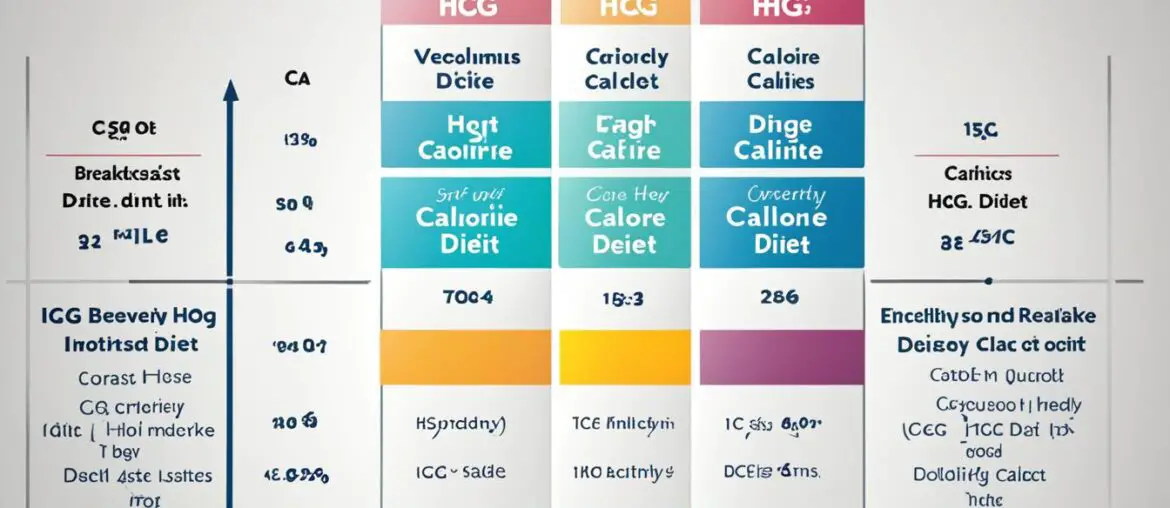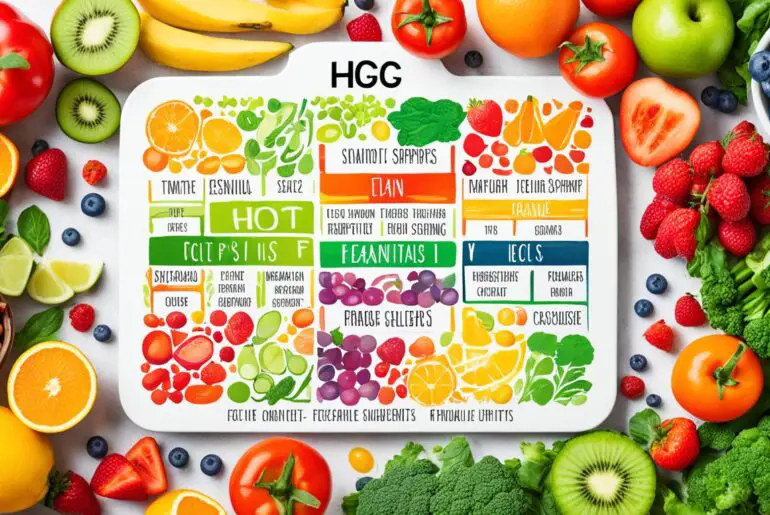Did you know that the HCG diet involves consuming only around 500 calories per day? That’s less than half of the recommended daily calorie intake for most individuals! The HCG diet, which combines extreme calorie restriction with the use of HCG hormone injections or supplements, has gained popularity as a quick weight loss method. However, its effectiveness and safety have been a subject of debate among experts.
The HCG hormone, or human chorionic gonadotropin, is a hormone produced during pregnancy. It has been speculated that HCG can boost metabolism and reduce hunger, leading to rapid weight loss. But is this truly the case? Let’s dive deeper into the facts and debunk the claims surrounding the HCG diet.
Key Takeaways:
- The HCG diet involves consuming only around 500 calories per day, which is far below the recommended daily calorie intake for most individuals.
- The HCG hormone is produced during pregnancy and has been suggested to aid in weight loss by boosting metabolism and reducing hunger.
- Multiple studies have concluded that weight loss achieved on the HCG diet is due to the severe calorie restriction alone and not the HCG hormone.
- Most HCG products on the market are labeled as homeopathic and do not contain real HCG, making them illegal for weight loss purposes.
- Consulting with a healthcare professional for safe and effective weight loss options is recommended over the controversial HCG diet.
The Function of hCG in the Body
HCG, or human chorionic gonadotropin, is a protein-based hormone produced during pregnancy. It plays a crucial role in maintaining the production of important pregnancy hormones in the body.
One of the key functions of hCG is to support the healthy growth of the uterus and fetus. It helps maintain the production of progesterone, which is essential for a successful pregnancy. Progesterone helps regulate the menstrual cycle, prepare the uterus for implantation of a fertilized egg, and supports the development of the placenta.
During the first trimester of pregnancy, hCG levels in the blood increase rapidly and reach their peak. This surge in hCG stimulates the corpus luteum, a temporary gland that produces progesterone until the placenta takes over this function. After the first three months of pregnancy, hCG levels decrease, and the placenta takes over progesterone production.
“hCG helps maintain the production of important pregnancy hormones such as progesterone, which supports the healthy growth of the uterus and fetus.”
Understanding the function of hCG in the body is essential for recognizing its importance during pregnancy. Without adequate hCG production, the levels of critical pregnancy hormones could be compromised, potentially leading to complications.
| Important functions of hCG in the body: |
|---|
| Helps maintain the production of progesterone |
| Supports the healthy growth of the uterus and fetus |
| Stimulates the corpus luteum |
| Regulates the menstrual cycle |
| Prepares the uterus for implantation |
| Aids in the development of the placenta |
By understanding the function of hCG in the body, we can appreciate its significance in maintaining a healthy pregnancy. The next section will delve into the claims surrounding hCG’s effect on weight loss and whether they hold up to scientific scrutiny.
Debunking the Claims of hCG’s Effect on Weight Loss

Proponents of the HCG diet assert that hCG, or human chorionic gonadotropin, enhances metabolism and facilitates weight loss without hunger. However, numerous studies have discredited these claims, underscoring that weight loss achieved on the HCG diet is solely attributed to the drastic calorie restriction rather than the hCG hormone itself.
Studies conducted on individuals following a calorie-restricted diet compared the effects of hCG injections to placebo injections. Surprisingly, the research found no significant difference in weight loss between the two groups. These findings reinforce the notion that the key driver of weight loss in the HCG diet is the severe calorie reduction, not the hCG hormone.
Furthermore, there is insufficient evidence to support the hypothesis that hCG significantly reduces hunger. While proponents claim that hCG helps suppress the appetite, scientific studies have failed to substantiate these assertions.
“Weight loss achieved on the HCG diet is predominantly due to the severe calorie restriction rather than the hCG hormone.”
The Hunger Reduction Effect of hCG – Myth or Reality?
Contrary to popular belief, the hunger reduction effect of hCG remains unsubstantiated by scientific evidence. Multiple studies have failed to demonstrate a noteworthy hunger-suppressing effect resulting from hCG supplementation or injections. The claim that hCG helps individuals feel less hungry while following the HCG diet is, therefore, highly questionable.
| Studies on hCG and Weight Loss | Conclusion |
|---|---|
| A randomized controlled trial published in the Journal of Clinical Endocrinology & Metabolism examined the impact of hCG on weight loss. The study found no significant difference in weight loss outcomes between the hCG and placebo groups. | No significant difference in weight loss between hCG and placebo injections on a calorie-restricted diet. |
| A meta-analysis of multiple studies conducted by the American Journal of Clinical Nutrition concluded that the weight loss effects of the HCG diet are primarily driven by caloric restriction rather than the hCG hormone. | Weight loss achieved on the HCG diet is mainly due to severe calorie restriction, independent of hCG supplementation. |
| A literature review published in the International Journal of Obesity analyzed various studies on the effectiveness of the HCG diet. The review found no compelling evidence supporting the weight loss superiority of the HCG diet over other calorie-restricted diets without hCG supplementation. | No scientific basis to assert the efficacy of the HCG diet in achieving superior weight loss outcomes compared to other calorie-restricted diets without hCG supplementation. |
Based on the evidence from multiple studies, it is clear that the weight loss mechanisms of the HCG diet are primarily attributed to severe calorie restriction rather than any intrinsic properties of the hCG hormone. Claims of hCG’s ability to boost metabolism and mitigate hunger are unsubstantiated by scientific research.
Understanding the Rules of the HCG Diet
The HCG diet is a structured plan consisting of three phases: the loading phase, the weight loss phase, and the maintenance phase. These phases help individuals achieve their weight loss goals while following specific guidelines. Let’s delve into each phase and explore the rules of the HCG diet.
The Loading Phase
The loading phase marks the beginning of the HCG diet and typically lasts for two days. During this phase, individuals are allowed to eat freely without restrictions. The purpose of this phase is to prepare the body for the subsequent calorie-restricted phase by replenishing glycogen stores and increasing fat reserves.
The Weight Loss Phase
The weight loss phase is the most crucial part of the HCG diet and typically lasts for three to six weeks, depending on individual goals. During this phase, individuals must strictly adhere to a low-calorie diet of approximately 500 calories per day. The meal plan for this phase primarily consists of:
- A portion of lean protein
- A serving of vegetables
- A piece of bread or a breadstick
- A serving of fruit
It is essential to avoid butter, oils, and sugar during this phase. Drinking plenty of water is encouraged to stay hydrated.
The Maintenance Phase
The maintenance phase is the final phase of the HCG diet and aims to stabilize weight loss. It typically lasts for three weeks. During this phase, individuals gradually increase their calorie intake but still avoid sugar and starches. This phase allows the body to adjust and maintain the achieved weight loss.
It’s important to note that the rules of the HCG diet may vary slightly depending on individual preferences and the guidance of a healthcare professional.
| Phase | Duration | Calorie Intake | Main Components |
|---|---|---|---|
| Loading Phase | 2 days | Unrestricted | Prepare the body for the weight loss phase |
| Weight Loss Phase | 3-6 weeks | Approximately 500 calories per day | Lean protein, vegetables, bread, fruit |
| Maintenance Phase | 3 weeks | Gradually increased calorie intake | Avoid sugar and starches |
Scam Products on the Market
When searching for HCG products on the market, it’s important to be cautious and discerning. Many products claim to offer real HCG for weight loss, but in reality, most of these products are labeled as homeopathic and do not actually contain genuine HCG. Homeopathic HCG products are not regulated and are illegal for weight loss purposes.
It’s crucial to note that genuine HCG, in the form of injections, can only be obtained through a doctor’s prescription. This type of HCG is primarily used as a fertility drug or hormone treatment and is not intended for weight loss.
Don’t be fooled by scams and false promises. Always consult with a healthcare professional before starting any weight loss regimen and opt for safe and legal options.
| Product Claims | Reality |
|---|---|
| Label: “Real HCG for weight loss” | Reality: Contains homeopathic HCG or no HCG at all |
| Availability: Over the counter | Reality: Genuine HCG injections are prescription-only |
| Regulation: None | Reality: Homeopathic HCG products do not have regulatory oversight |
| Legality: Legal for weight loss use | Reality: Homeopathic HCG products are illegal for weight loss purposes |
It’s essential to prioritize your health and safety when embarking on a weight loss journey. Choose reputable and trustworthy methods that are backed by scientific evidence and medical supervision. Remember, there are no shortcuts to sustainable and healthy weight loss.
Conclusion
The HCG diet is deemed unsafe, unhealthy, and illegal. The United States Food and Drug Administration (FDA) has not approved HCG as a weight loss aid. Additionally, there are numerous side effects associated with this diet. It is strongly recommended to consult with a healthcare professional for safe and effective weight loss alternatives.
Fortunately, there are several other methods available that are both safer and more sustainable for achieving weight loss goals. These alternatives focus on healthy eating habits, regular physical activity, and gradual progress. A personalized and balanced approach, along with professional guidance, can lead to long-term weight management success.
Exploring different options such as balanced meal plans, portion control, and mindful eating techniques can provide a healthier and more effective approach to weight loss. Additionally, engaging in regular exercise, such as cardio and strength training, helps boost metabolism and enhance overall well-being. When it comes to achieving weight loss goals, it’s essential to prioritize safety, long-term sustainability, and overall health over quick fixes.
FAQ
What is the daily calorie intake on the HCG diet?
The daily calorie intake on the HCG diet is around 500 calories per day.
Does the HCG hormone have any effect on weight loss or reducing hunger?
No, multiple studies have concluded that weight loss achieved on the HCG diet is solely due to the severe calorie restriction, and the HCG hormone has no significant effect on weight loss or reducing hunger.
What are the rules of the HCG diet?
The HCG diet is typically divided into three phases: the loading phase, the weight loss phase, and the maintenance phase. During the weight loss phase, individuals are only allowed to eat two meals per day, with each meal consisting of a portion of lean protein, a vegetable, a piece of bread, and a serving of fruit. Butter, oils, and sugar should be avoided, while drinking plenty of water is encouraged.
Yes, most of the HCG products available on the market are labeled as homeopathic and do not actually contain real HCG. Homeopathic HCG products do not have any regulatory oversight and are illegal for weight loss purposes. Genuine HCG, in the form of injections, can only be obtained through a doctor’s prescription and is used as a fertility drug or hormone treatment.
Is the HCG diet safe and effective for weight loss?
No, the HCG diet is considered unsafe, unhealthy, and illegal. The FDA does not approve HCG as a weight loss aid, and there are numerous side effects associated with the diet. It is recommended to consult with a healthcare professional for safe and effective weight loss options.
What are the alternatives to the HCG diet for weight loss?
There are many other methods available that are much safer and more sustainable for achieving weight loss goals. It is recommended to explore options such as a balanced diet, regular exercise, and consulting with a registered dietitian or healthcare professional for personalized guidance.




